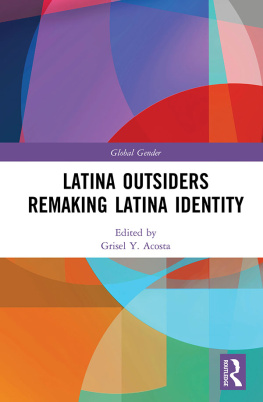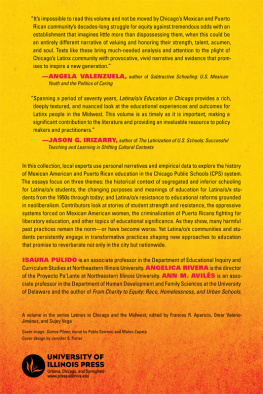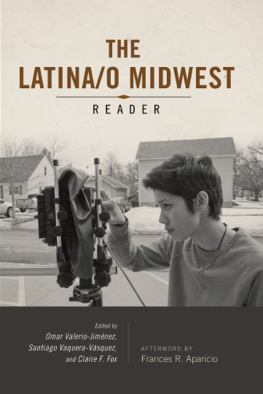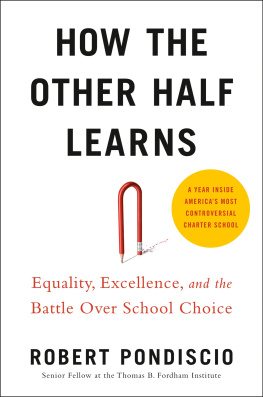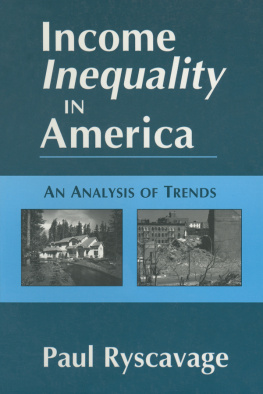The Starting Line
Latina/o Children, Texas Schools, and National Debates on Early Education
ROBERT CROSNOE WITH CLAUDE BONAZZO AND AIDA RAMOS

University of Texas Press
Austin
Copyright 2020 by the University of Texas Press
All rights reserved
First edition, 2020
Requests for permission to reproduce material from this work should be sent to:
Permissions
University of Texas Press
P.O. Box 7819
Austin, TX 78713-7819
utpress.utexas.edu/rp-form
All images are courtesy of the author
Library of Congress Cataloging-in-Publication Data
Names: Crosnoe, Robert, author.
Title: The starting line : Latina/o children, Texas schools, and national debates on early education / Robert Crosnoe ; with Claude Bonazzo and Aida Ramos.
Description: First edition. | Austin : University of Texas Press, 2020. | Includes bibliographical references and index.
Identifiers: LCCN 2020027884
ISBN 978-1-4773-2238-3 (cloth)
ISBN 978-1-4773-2239-0 (library ebook)
ISBN 978-1-4773-2240-6 (ebook)
Subjects: LCSH: Hispanic American childrenEducation (Preschool)Texas. | Low-income studentsEducation (Preschool)Texas. | Hispanic American childrenEducation (Preschool)United StatesCase studies. | Hispanic American childrenEducation (Preschool)TexasEvaluation. | Educational changeUnited States.
Classification: LCC LC2670.2 .C76 2020 | DDC 371.829/68073dc23
LC record available at https://lccn.loc.gov/2020027884
doi:10.7560/322383
For my own students and everyones students.
For my own children and everyones children.
Contents
Preface
I have spent a great deal of time in different kinds of schools, and they all have their own kind of magic. Throughout most of my career, I have been interested in what high schools are like, and whenever I am in a high school, I am deeply struck by the way hordes of teenagers flow through classrooms and hallways. It is a magic of energy and rhythm. In the 2000s, my focus shifted to little kids, partly because my own children were young at that time but also because early childhood education was facing increasing attention from policy makers. Unlike the larger and more diverse high schools I have studied, the many preschool classrooms I have visited and observed typically serve a more homogeneous student population of young, low-income Latina/o children, many or most of whom come in as English language learners. The magic of these classrooms is more about a kind of mayhem; they are filled with noise, movement, laughter, and hugs, and more than anything else, they just seem alive. I leave them a bit overwhelmed, suffering from sensory overload, but also excited and hopeful.
Amid this magical mayhem, something else becomes clear upon reflection when I am back in the quiet of my office or home. Underlying all of it is a calm and steady ethos of caring, with teachers who are invested in the children they are serving, children who are engaged in their learning, parents who are dedicated to both, and an order the caring gives to the seeming chaos that makes clear the educational goals at work. Within this ethos of caring, people seem dedicated to the idea that early childhood education matters, that there will be rewards if they get it right and consequences if they do not. They care. Consequently, most of the teachers seem to be on the lookout for how to make things work better. They seem to believe in what they are doing but also believe that there is room for improvement.
As a researcher studying early childhood education, I have taken a cue from these educators and the families they serve by believing in the system and what it represents while also searching for how it might get better. This book is my attempt to do so in ways that recognize strengths, identify opportunities to get stronger, and harness the incredible zeal for change on the ground. It is based on my years as a researcher involved in national discussions of early childhood education to promote policies that enhance the future prospects of vulnerable groups of children. It is also based on my years of conducting extensive research within early childhood education programs in my home state of Texas, serving a particularly vulnerable group with great potential to respond to such policy investments.
Through these experiences I have developed an argument about early childhood education and its role in the future of the growing Latina/o population in Texas and the United States as a whole. The argument has three basic principles:
Increasing the number of young children from historically disadvantaged segments of society in high-quality early childhood education is a potentially effective strategy for combatting persistent inequalities in educational attainment, including those related to the large, growing, and often threatened Latina/o population.
This goal can be supported by a holistic approach recognizing the different ways that early childhood education classrooms are connected to the larger contexts in which they are situated and encompass a complex exchange of academic and social processes.
Such an approach requires careful attention to the daily experiences of children, their teachers, and their parents in and around early childhood education classrooms, and the Texas public prekindergarten (pre-K) program is an ideal place to do just that for Latina/o children.
In this book, with some help from two of my former students, I will take a deep dive into each of the three points of this argument. Doing so involves laying out the national debates about early childhood education and Latina/o children, using Texas as a case for learning about and from these debates, then moving them forward, and going into classrooms in a large, heavily Latina/o, urban district in Texas to give a glimpse of what is going on and hear the human voices involved.
Motivating this activity is a simple pair of questions: What about early childhood education for Latina/o children is working, and what needs to be improved? Answering these driving questions is my goal in this book. This goal is important because the stakes are indeed high, right now and for the future. They are high for the individual children from diverse backgrounds who increasingly will need educational success to thrive in their lives. They are high for a society in and out of Texas that increasingly depends on having an educated populace and workforce but still is divided by racial/ethnic, socioeconomic, and other kinds of inequalities that undermine that mission. These educational stakes play out over childrens academic careers, which last many years and cross many institutions. If one thinks of education as a journey, early childhood education is the starting line. Getting things right at this starting line may solve a lot of problems on the journey. That is why the world is watching.
I had my own journey to the discovery of the importance of the starting line, which grew out of the aforementioned gradual shift in my research interests from secondary school and adolescence to early childhood and early education. In retrospect, there were four important factors underlying this journey, most but not all professional. The first was that in 2004 I was asked to join the Eunice Kennedy Shriver National Institute of Child Health and Human Development (NICHD) Early Child Care Research Network, which was a collection of researchers running a national study funded by the National Institutes of Health to determine the effects of early child care on child development (NICHD Early Child Care Research Network, 2005). In that network, I was surrounded by top early childhood education scholars, and they had a huge influence on me. In particular, they showed me how what I was studying among adolescents in high school could not be separated from what happened to those adolescents when they were young.


